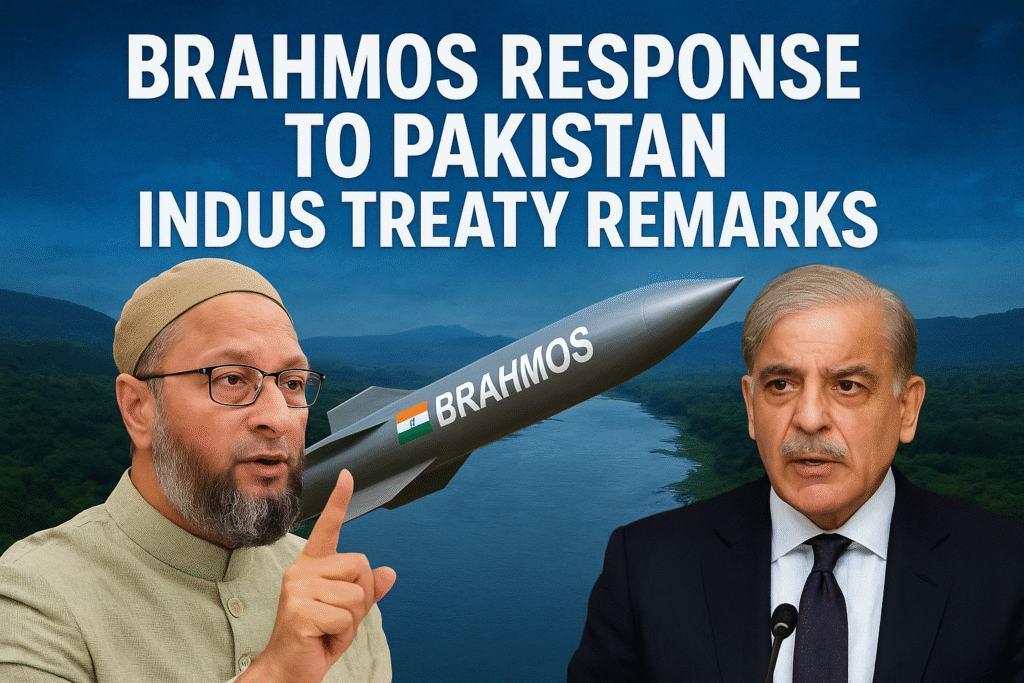
Introduction
The political rivalry between India and Pakistan flared up once again as All India Majlis-e-Ittehadul Muslimeen (AIMIM) chief Asaduddin Owaisi delivered a sharp BrahMos Response to Pakistan Indus Treaty Remarks made by Prime Minister Shehbaz Sharif.
Sharif, addressing a gathering in Pakistan, vowed that India would never be able to “snatch even one drop” of water from Pakistan. Owaisi’s reply was both political and strategic, citing India’s BrahMos missile capability as a deterrent to any threats. This exchange follows India’s decision to keep the Indus Waters Treaty in abeyance — a move that has deeply unsettled Islamabad.
Sharif’s Indus Treaty Warning
Speaking at a public ceremony, Shehbaz Sharif issued a stern warning to New Delhi:
“If you threaten to hold our water, you cannot snatch even one drop of Pakistan.”
Sharif’s statement underscores Pakistan’s dependency on the Indus River system for agriculture and daily life. His remarks came in response to India’s suspension of the treaty, a decision Pakistan views as a direct threat to its water security.
Former foreign minister Bilawal Bhutto-Zardari took this further, calling India’s action an “attack on the Indus Valley Civilisation” and hinting at a possible conflict if India moved forward.
Owaisi’s BrahMos Response
Owaisi minced no words in countering Sharif’s claims.
“The Government of India has kept the Indus Water Treaty in abeyance. We have BrahMos with us. Such threats will have no effect on India. Enough is enough,” he declared.
By referencing the BrahMos missile, jointly developed by India and Russia, Owaisi signaled that India’s military preparedness matches its political stance. The missile is known for its speed, precision, and ability to hit strategic targets — qualities that make it a formidable deterrent.
Bilawal Bhutto’s War Rhetoric and BJP’s Sarcasm
When Bilawal Bhutto-Zardari hinted at possible war over water, BJP leader Mithun Chakraborty responded with pointed sarcasm:
“If you keep talking like this and we lose patience, one BrahMos after another will be launched. We might even build a dam where 140 crore Indians will pee, then open it to create a tsunami.”
Although humorous, his comment carried a serious undertone — that India will not tolerate aggressive rhetoric over a treaty that has been in place for decades.
Pakistan’s Nuclear Threat
The tensions were further fueled by Pakistan Army Chief Asim Munir, who stated during an event in the US:
“We are a nuclear nation. If we think we are going down, we’ll take half the world down with us.”
Such nuclear brinkmanship has long been part of Pakistan’s defense narrative, but its repetition in the current context has raised concerns in global diplomatic circles.
The Indus Waters Treaty Background
Signed in 1960, the Indus Waters Treaty is one of the few agreements between India and Pakistan that has survived wars and military standoffs. It allocates the eastern rivers (Ravi, Beas, Sutlej) to India and the western rivers (Indus, Jhelum, Chenab) to Pakistan.
India’s move to keep the treaty in abeyance reflects its frustration over Pakistan’s continued support for cross-border terrorism and obstruction of Indian water projects.
Strategic Significance of BrahMos Missile
The BrahMos missile is more than just a weapon — it is a symbol of India’s technological and strategic capabilities:
- Speed: Mach 2.8 to 3.0
- Range: Over 400 km
- Payload: Conventional warheads
- Precision: Pinpoint accuracy
By invoking BrahMos in his statement, Owaisi emphasized that India’s defense readiness can back its diplomatic decisions, making any threat over the Indus Treaty ineffective.
Rising Tensions and Diplomatic Fallout
This verbal sparring has heightened tensions between the two neighbors. Experts warn that weaponizing water issues could destabilize the already fragile peace in South Asia.
However, some strategic analysts argue that India’s firm stance is essential to counter Pakistan’s aggressive posturing, especially when backed by threats of war or nuclear escalation.
Conclusion
The BrahMos Response to Pakistan Indus Treaty Remarks encapsulates India’s approach to safeguarding its national interests — a mix of political firmness and military capability.
For Pakistan, water security is undeniably critical, but resorting to ultimatums, war rhetoric, and nuclear threats only widens the gulf between the two nations. For India, the challenge lies in balancing assertiveness with diplomatic outreach to prevent an escalation that could spiral out of control.
As the Indus River continues to flow between the two countries, it remains not only a source of life but also a potential flashpoint — one that requires cooler heads and careful negotiation before words turn into irreversible actions.

